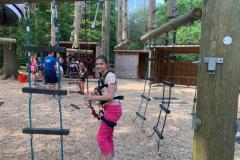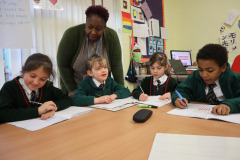


¬ BACK TO MAIN CURRICULUM PAGE
The learning of French provides a valuable educational, social, and cultural experience for all pupils. Pupils develop communication and literacy skills that lay the foundation for future language learning. They develop linguistic competence, extend their knowledge of how language works and explore differences and similarities between French and English.
Learning another language raises awareness of the multilingual and multicultural world and introduces an international dimension to pupils’ learning, giving an insight into their own culture and those of others. Learning French provides a medium for cross-curricular links and the reinforcement of knowledge, skills and understanding developed in other subjects.
A high-quality languages education should nurture children’s curiosity and deepen their understanding of the world. The teaching should inspire children to express their ideas and thoughts in another language, while also understanding and responding to the French language, both in speech and in writing.
The national curriculum for languages aims to ensure that all pupils:
Although the teaching of Modern Foreign Languages is only statutory in the KS2 curriculum, we at Farnborough Primary School believe that preparing the children in KS1 will have a positive effect on their enthusiasm for languages, creating a strong base to develop children further in becoming successful linguists.
We aim to do this by:
The curriculum for years 3-6 is resourced by ‘Language Angels’ Scheme of work. This will progressively develop pupil skills in foreign languages through regularly taught and well-planned weekly lessons in both Key Stage 1 and Key Stage 2 which will be taught by Madame Olatunji (Specialist MFL Teacher).
Children will progressively acquire, use, and apply a growing bank of vocabulary, language skills and grammatical knowledge organised around age-appropriate topics and themes – building blocks of language into more complex, fluent and authentic language.
All teachers will know where every child is at any point in their foreign language learning journey.
The planning of different levels of challenge and which units to teach at each stage of the academic year will be addressed dynamically and will be reviewed in detail annually as units are updated and added to the scheme. Lessons offering appropriate levels of challenge will be always taught to ensure pupils learn effectively, continuously building their knowledge of and enthusiasm for French.
The French curriculum at Farnborough is split into Early Language, Intermediate, and then Progressive and Creative Language. Early Language units are entry level units and are most appropriate for KS1 and Year 3 pupils or pupils with little or no previous foreign language learning. Intermediate units increase the level of challenge by increasing the amount and complexity (including foreign language grammar concepts) of the foreign language presented to pupils. Intermediate units are suitable for Year 4-5 pupils or pupils with embedded basic knowledge of the foreign language. Progressive and Creative Curriculum units are the most challenging units and are suitable for Year 6 pupils or pupils with a good understanding of the basics of the language they are learning. Grouping units into these Teaching Type categories ensures that the language taught is appropriate to the level of the class and introduced when the children are ready. Children will be taught how to listen and read longer pieces of text gradually in the foreign language and they will have ample opportunities to speak, listen to, read and write the language being taught with and without scaffolds, frames and varying levels of support.
We measure the impact of our curriculum through the following methods:
The MFL subject leader will continue to monitor the impact MFL teaching is having on the children’s learning, to ensure progress of knowledge and skills being taught. Impact will also be measured through key questioning skills built into lessons, child-led assessment and summative assessments aimed at targeting next steps in learning.
Please click on the links below for more:
Whole School French Curriculum Map